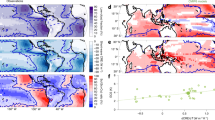Abstract
CLIMATE warming can cause changes in the optical properties of low clouds, which may in turn amplify or diminish the warming1,2. But both the sign and magnitude of such feedbacks have been uncertain, largely because the observational evidence for variations in the large-scale optical properties of clouds has been very limited. Recently, analysis of data from the International Satellite Cloud Climatology Project yielded a relationship between low-cloud optical thickness and cloud temperature that implies a positive feedback between clouds and climate3. Here we use a two-dimensional radiative–convective model to assess the effect of such a feedback on the climate change associated with a doubling of the atmospheric carbon dioxide concentration. We find that, zonally averaged, the feedback is positive in the Northern Hemisphere and is stronger at lower than at higher latitudes. The positive feedback amplifies the overall global climate sensitivity, and the latitudinal gradient in the strength of the feedback acts to eliminate the highlatitude amplification of the greenhouse warming predicted by most climate models.
This is a preview of subscription content, access via your institution
Access options
Subscribe to this journal
Receive 51 print issues and online access
$199.00 per year
only $3.90 per issue
Buy this article
- Purchase on Springer Link
- Instant access to full article PDF
Prices may be subject to local taxes which are calculated during checkout
Similar content being viewed by others
References
Wang, W.-C., Rossow, W. B., Yao, M. S. & Wolfson, M. J. atmos. Sci 38, 1167–1178 (1981).
Platt, C. M. R. & Harshvardhan J. geophys. Res. 93, 11051–11058 (1988).
Tselioudis, G., Rossow, W. B. & Rind, D. J. Clim. 5, 1484–1495 (1992).
Ellis, J. S. thesis, Colorado State Univ. (1978).
Ramanathan, V. et al. Science 243, 57–63 (1989).
Hartmann, D. L., Ockert-Bell, M. E. & Ebert, E. E. J. Clim. 5, 1281–1304 (1992).
Hansen, J. et al. in Climate Sensitivity: Analysis of Feedback Mechanisms (eds Hansen, J. E. & Takahashi, T.) 130–163 (Geophys. Monogr. Ser. No. 29, Am. Geophys. Un., Washington DC, 1984).
Somerville, R. C. J. & Remer, L. A. J. geophys. Res. 89, 9668–9672 (1984).
Mitchell, J. F. B., Senior, C. A. & Ingram, W. J. Nature 34, 132–134 (1989).
Roeckner, E. Nature 335, 304 (1988).
Le Treut, H. & Li, Z.-X. Climate Dyn. 5, 175–187 (1991).
Rossow, W. B. & Schiffer, R. A. Bull. Am met. Soc. 72, 2–20 (1991).
Betts, A. K. & Harshvardhan . J. geophys. Res. 92, 8483–8485 (1987). (see ref. 2)
Tselioudis, G. thesis, Columbia Univ. New York (1992).
Hansen, J. et al. Mon. Weath. Rev. 111, 609–662 (1983).
Author information
Authors and Affiliations
Rights and permissions
About this article
Cite this article
Tselioudis, G., Lacis, A., Rind, D. et al. Potential effects of cloud optical thickness on climate warming. Nature 366, 670–672 (1993). https://doi.org/10.1038/366670a0
Received:
Accepted:
Issue Date:
DOI: https://doi.org/10.1038/366670a0
This article is cited by
Comments
By submitting a comment you agree to abide by our Terms and Community Guidelines. If you find something abusive or that does not comply with our terms or guidelines please flag it as inappropriate.



